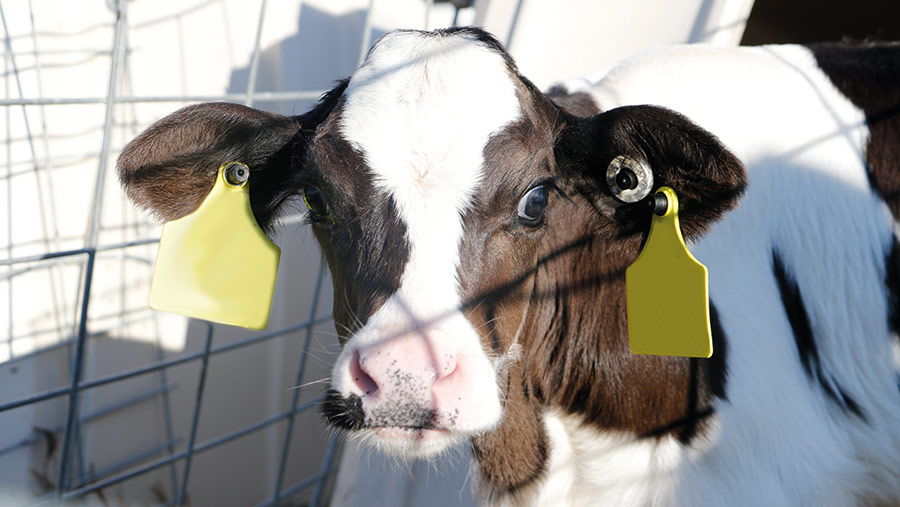6 signs of pneumonia in calves to look out for
 © Rhian Price
© Rhian Price Pneumonia is a respiratory disease that causes inflammation of the lungs. An infection in pre-weaned calves can reduce milk production later in life by 10-15% depending on the severity.
But if you catch it early – in the first two-to-three days – calves are much more likely to recover fully.
Therefore, knowing the symptoms is key. There are six main signs calves with pneumonia will exhibit. If a calf has three of these you should treat it immediately.
Below, Dr Scott Abbott froofm Dairy Vet Management and director of technical services at breeding company World Wide Sires, talks through the main signs to look out for.
See also: Q&A: Pneumonia in calves and how to combat it
1. Temperature
Take the rectal temperature. Higher than 39.5C indicates the calf may be sick.
2. Nasal discharge
Look for a small amount of cloudy discharge up to excessive mucus discharge.
3. Coughing and increased respiration rate
Pinch the calf’s throat gently. If it starts coughing it’s a sign it has irritation. Other symptoms to look out for are repeated coughing in calves with more severe symptoms, and laboured breathing.
4. Slow feed intake
Calves with pneumonia usually keep eating and drinking, but they will have a slower intake and will remain standing after they have eaten. This is because they feel uncomfortable due to feeding increasing the amount of pressure on their already-swollen lungs.
5. Eye discharge
This can be a small amount of discharge near the tear duct, up to heavy discharge surrounding the eye and which has formed crusts.
6. Ears
In clinical cases calves’ ears will sag and they will also flick their ears. This is a sign they have mycoplasma which causes fluid on the ear.
In very severe cases it can cause swelling of the forehead due to the immune glands being enlarged.
If calves have these symptoms treat immediately without diagnosing another two signs using an anti-inflammatory and antibiotic.
Advice on treating calves
- Use an antibiotic that targets the bacteria causing pasteurella and mycoplasma – speak to your vet to ensure you pick the right one.
- Administer pain relief.
- Keep calves drinking milk: One of the biggest failures often seen in the treatment of sick calves is removing or reducing the amount of milk fed to animals. This reduces energy and the calf will lose weight and become weaker.
- Calves with pneumonia usually still want to drink/eat. It is not recommended to tube feed milk to calves older than 10 days as the milk could get into the rumen and cause digestive problems.
- If calves won’t drink (this is often the case with calves that have diarrhoea) then consider tubing them small amounts (1 litre a day).
